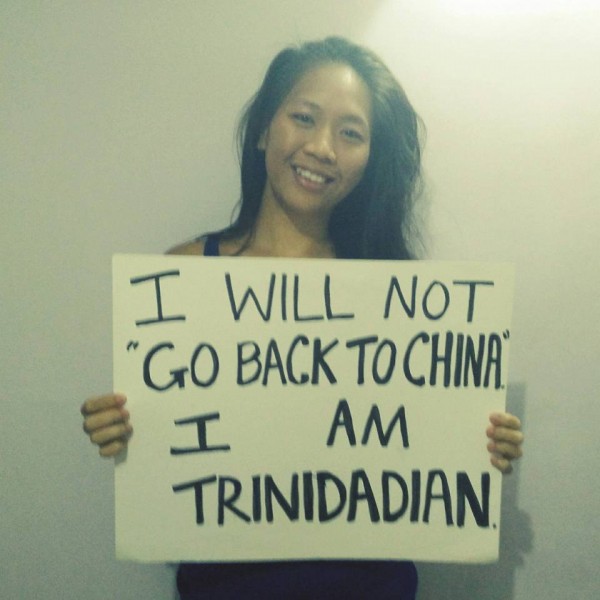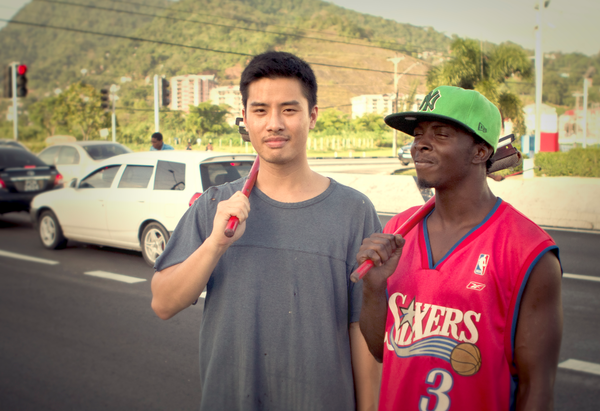
Chinese-Trinidadian Lily Kwok's photo, which she posted publicly on Facebook, in an effort to counteract racial stereotyping.
The online retaliation by Trinidad and Tobago citizens of Chinese descent over the latest surge of racial stereotyping against them is attracting a lot of attention. The anti-Chinese sentiments were ignited by a video of a couple — allegedly at a local Chinese restaurant — skinning a dog. It went viral on social media and was exacerbated by inflammatory comments by the country's health minister.
One “Chinee girl” (as they are sometimes referred to in Trinidad), Lily Kwok, couldn't take it anymore and posted a photo of herself on Facebook holding a placard that said, “I will not ‘Go back to China’. I am Trinidadian.” She was immediately supported by a slew of like-minded citizens, some of Chinese descent, some not.
Her spunk and outspokenness so affected blogger Rhoda Bharath that she interviewed Kwok about the experience of living in her Chinese skin in Trinidad and Tobago. Bharath introduced the post by summarising that Kwok “has Chinese parents, a lovely mind and a bruised spirit. She feels under represented, unempowered and overwhelmed”. As it turned out, the dog-skinning incident was not the first one that precipitated online anti-Chinese sentiment. Kwok recalled:
This first began with the incident of the 4 Chinese nationals who were involved in the stealing of the turtle eggs in June, 2015. I was absolutely flabbergasted […] As someone who loves animals and enjoys turtle-watching, I was very upset at the situation. But you know what else also upset me? The racialized comments that followed after on social media. There is no doubt in my mind that what those men did was criminal and they should be dealt with by the law accordingly. However, instead of purely focusing on the criminality of the action […] many comments diverged into racial stereotyping; assumptions that ‘Chinee people does eat anything’. Moreover, some comments went so far as to request that ‘all dem Chinee need to be sent back.’ I found this amusing considering that when pictures of people standing on leatherback turtles surface on social media, people rarely (if ever) involve ‘race’ in admonishing the acts.
Of the dog-skinning incident, she said:
No one denies that a dog is being skinned in the video. That is indeed a fact. And yes, Chinese nationals were once again involved in such an act. That is indeed a fact. But you know what are not facts? That the preparation of the dog to be eaten is any way connected to a Chinese restaurant, that dog meat is being used as a substitute for other meat in Chinese restaurants, and that ALL Chinese people and people of Chinese ancestry eat dog. Yet, even though these are not hard, substantiated facts, many people have made extremely racist and xenophobic comments surrounding them […]
Instead of focusing on the real issue at hand, which is having a meaningful discussion on animal rights and protection in Trinidad and Tobago, we have devolved into using the situation as a platform to unearth deep-seated racism towards Chinese people and people of Chinese ancestry.
Noting that complacency about these kinds of issues is dangerous, Kwok said that she deals with this kind of ethnic stereotyping “through education”:
Sometimes you have to remind someone of your own humanity and individuality. […] To cultivate unity, harmony and love within our society we must first begin to show love ourselves.
Three years ago, in time for Trinidad and Tobago's 50th anniversary of independence from Great Britain, Joshua Lue Chee Kong posted a photography project online that demonstrated just how deep-seated Trinidad and Tobago's racial perceptions were. He streamed the project into four “series” — Brown, White, Yellow and Black — and posed, as a Chinese person, in various stereotypical scenarios that made it evident, without saying a word, just how ridiculous these impressions are. The Brown Series was a play on the history of Indian indentured labourers who arrived in Trinidad and Tobago to work in the sugar cane fields post-Emancipation:
The White Series took on the idea of light-skinned Trinidadians being entitled and carefree:
The Yellow Series was almost prophetic, as it featured several images of Lue Chee Kong in a kitchen with packs of “dog meat”:
Finally, the Black Series featured Lue Chee Kong at an intersection, poised to clean car windshields:
It is astounding that these two posts are years apart; Lily Kwok could have been commenting on Joshua Lue Chee Kong's images when she said:
You, as a person in a ‘callaloo country […] have no right to humiliate or dehumanize another human being on the basis of their ‘status’ within the country. This ‘us’ versus ‘them’ mentality, perpetuated since the dawn of colonialism, is a little too old for 2015.











3 comments